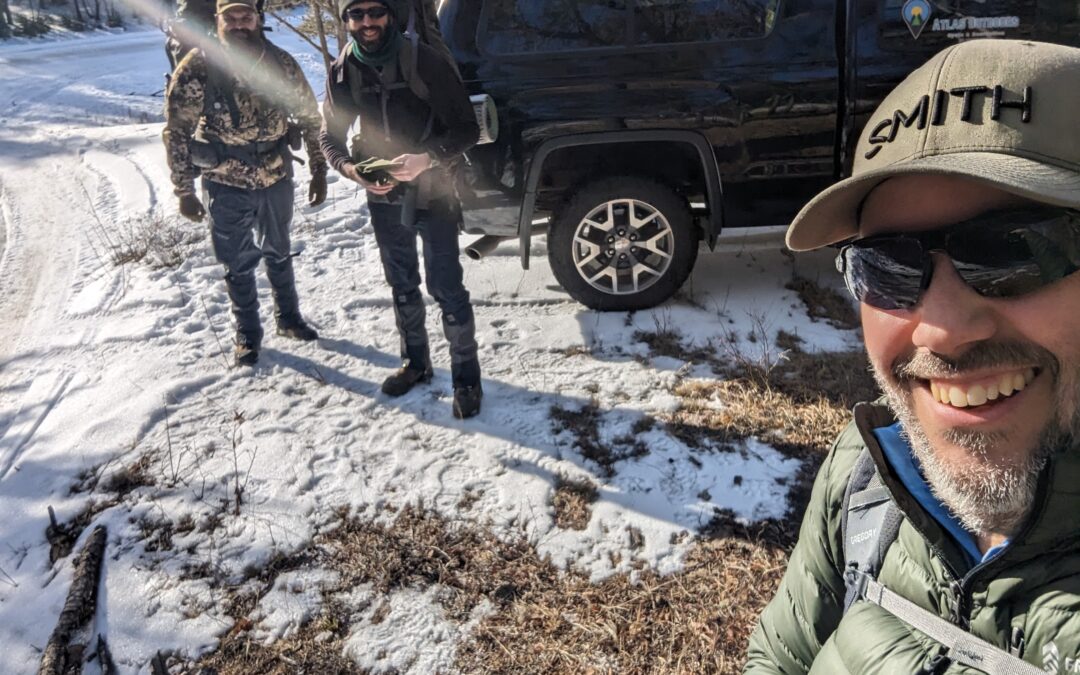Introduction
If you haven’t tried winter camping before, it is an adventure! And when I say “camping” in this post, I mean back country, carrying your gear on your back (or dragging it in a sled behind you). I’m not necessarily referring to those who drive in, trailer camp or otherwise. Winter camping where you need to know how to make a fire, because if you don’t there is no propane or electric back up. Winter camping where you need the right sleeping gear, because if you don’t there is no “extra blanket” you can pull out of a cupboard. It’s an adventure!
But an adventure that, with a bit of planning, know how and the right equipment, can be warm and enjoyable. It isn’t being cold and uncomfortable, but instead it’s about enjoying the serenity of the outdoors.
Last year, Adam and Chris and Dave had a great time winter camping (in weather much colder than this weekend). So this year, I decided I would join and experience my first winter camping outing. And it was such a great time!
This post will go over our most recent adventure, as well as the gear we used to make it an enjoyable time. How we found the perfect clearing, gathered firewood and even melted snow for water for cooking.
The Hike Out: Adventure Awaits
We drove out on a Saturday morning to the Nisbet forest, a Saskatchewan Provinical forest located between Rosthern and Prince Albert, between Highway 11 and the North Saskatchewan River. It is a great area of nature that is enjoyed by many, whether hiking, sking or traversing the many trails on a powered machine such as a quad or snowmobile. And this time of year, it is quiet and peaceful.
We found a nice spot to park the truck off the road, strapped on the backpacks and got ready to hike. We were surprised at the lack of snow for this time of year, so we opted to leave the snowshoes behind (which was a good choice, they would not have been used and only added weight).
Our spirits were high as we enjoyed the hike, having some idea of what trails to try, but really just enjoying the area and the hike without the constraints of time or

deadlines. The first trail we tried stopped at a dead end just two kilomteres into the hike (I was leading, I’m not sure why that was a good idea considering my reputation with directions!). While the clearing was perfect, we weren’t even close to being ready to stop and setup camp, so we turned around and tried a different trail. This trail took us around and in between a few “lakes” (sloughs really) as we headed north towards Lobstick lake. As you can see from the map below, we had a few out and back sections as we looked for a perfect clearing. All told, we hiked around 8.5kms before setting up camp.

Carrying enough gear for an outing such as winter camping is no easy feat. My pack weighed in at 42lbs. Chris and Adam’s were more (they brought some extra fun for target shooting). Winter camping means bring warm clothes, extra clothes and so on. In addition, we each hauled a fair amount of water (summer camping we just bring a filter to drink from a nearby water source) which weighs a lot. But having proper backpacks made this task enjoyable. Sure, the packs were heavy but within a few hundred meters we all commented how the packs settled in and the hike was enjoyable. Of course, we still stopped for a break and to roast some deer sausage over a fire half way through the hike. In life, it is important that you enjoy the journey too, not just the destination!
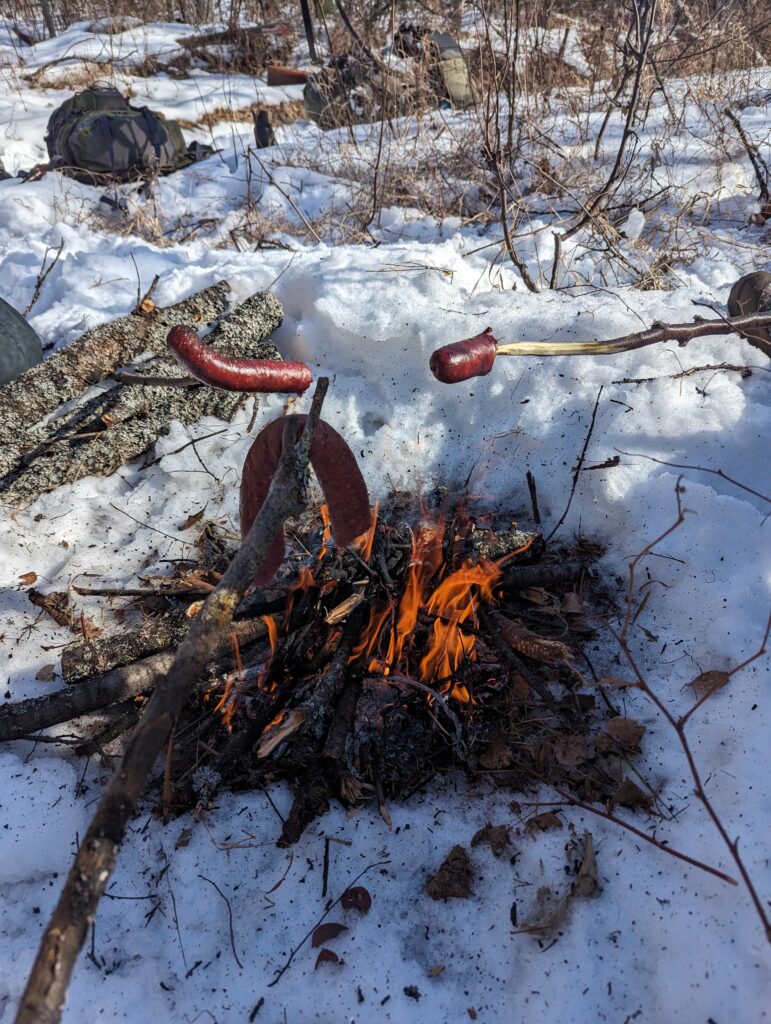
Finding the Perfect Clearing: Setting Up Camp
Our hike took us along a winding trail, one used by snowmobiles (if there was more snow) and quads as well as countless deer, coyotes, moose and more. The wildlife, while scarce to spot, were obviously active on these trails as their tracks were numerous. The wind was blowing strong, but with the thick brush all around it didn’t affect us until we reached Lobstick lake. As soon as the trail turned and approached the lake, the wind hit us full force. We surely weren’t going to set up camp in that type of environment, so we started walking back, looking for where we might set up camp. The brush that did so well protecting us from the onslaught of the wind was now an issue as there was no clearings where we could set up camp!
The beauty of the forest around us and the tranquility of the snow were soon forgotten to us as we started feeling fatigue from the long hike and heavy load. Finally, the forest changed from poplars and birch trees to more evergreens, which meant less underbrush. Soon enough we found the perfect spot to set up our camp for the night.
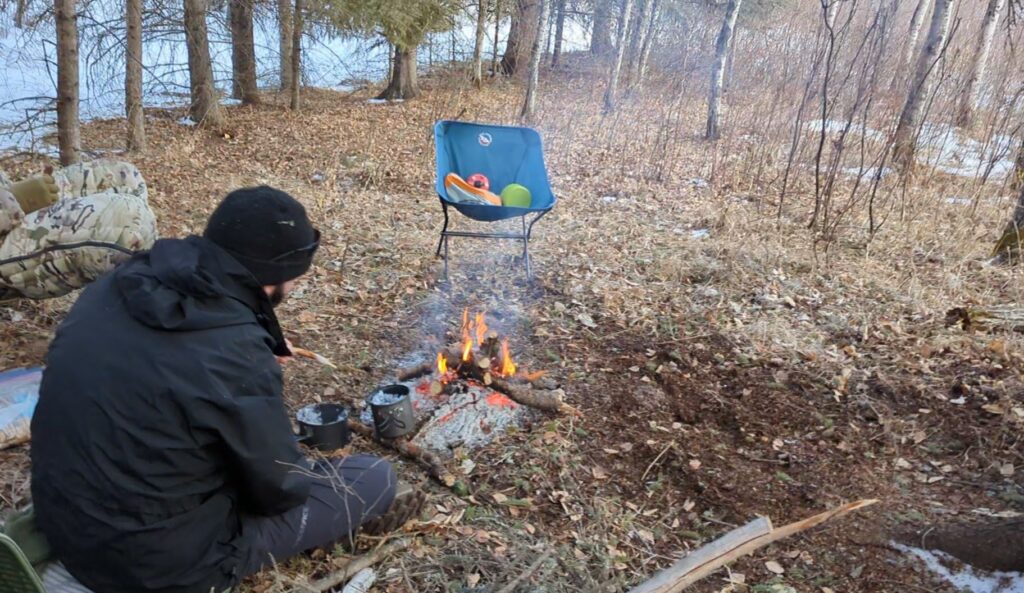
The perect clearing was one that kept us out of the elements as much as possible, in this case the wind. It also needed to have flat, level areas for setting up the tents as well as a campfire area. And, finally, there needed to be ample firewood nearby as well as a good supply of clean-ish snow we would need for our cooking. This clearing checked all the boxes for our needs. We happily set down our packs, and started surveying the area. Where would we set up the tents? Where would the fire be?
Setting Up Camp: Creating Our Winter Space
Before long, we each got to work. Chris started setting up his Lite Outdoors tent and stove. Adam started getting his bivy and tarp setup. And I grabbed the 15″ Sven saw and started building a pile of firewood from the deadfall and dead branches in the area. That saw made short work of the branches and deadfall I found nearby, building a pile of firewood quickly that would sustain us for the day, evening and next day as well. And the fact that this saw folds down and packs away so easily makes it a must have on any backcountry adventure!
Chris had the tent setup quickly, staking down the four corners, inserting the central pole and then tying back the guy lines. He then worked on setting up the titanium stove, and getting it setup in the middle of the tent.
A few feet away, Adam cleared some brush and set up his bivy. A bivy is basically a sleeping bag sized tent. It’s the minimalistic tent that does the job of keeping the elements out without being big and bulky. And for cold weather, it helps trap body heat better than a larger tent. Overtop of the bivy, Adam set up his tarp so he had a spot to store his bag and other items out of any wind or snow that may occur.
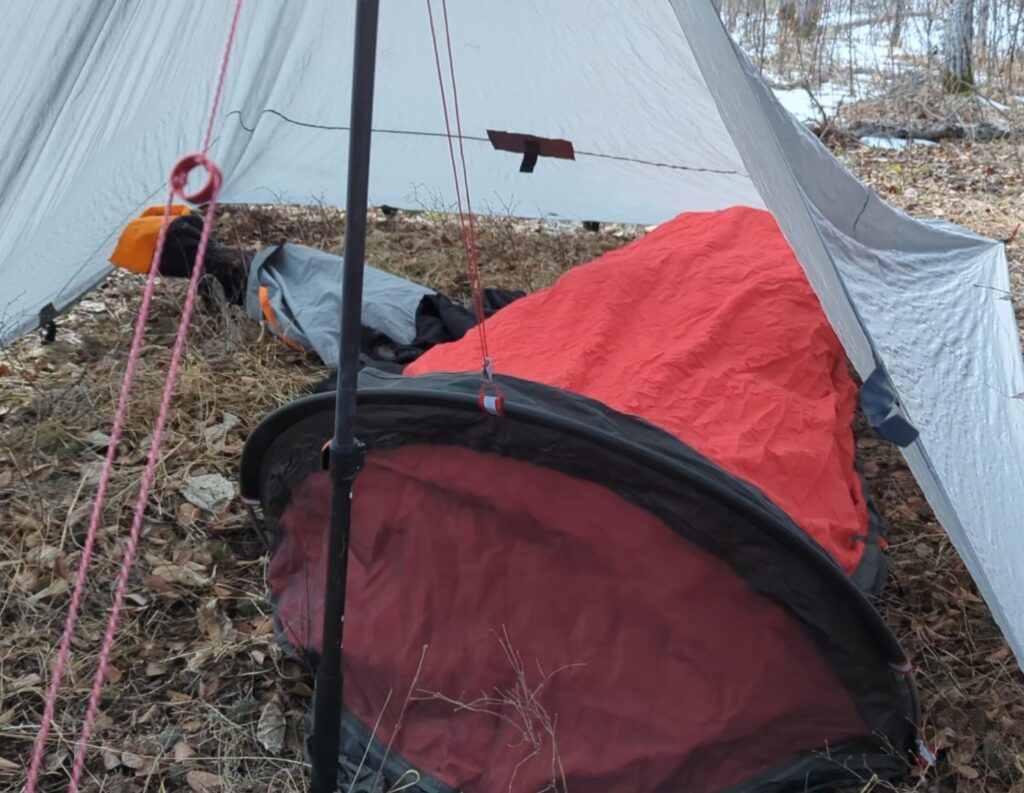

When you’re backpacking like this for a winter camping outing, choosing gear that will keep you warm as well as being small, lightweight and packable can be a balancing act. However, the technology is there to make your trip an enjoyable one. All three of us brought insulated sleeping pads, winter rated sleeping bags (or quilts) and more. And all of what we brought rolled and packed up very small and compact.
For my set up, sleeping on the ground, I used a closed cell foam sleeping pad by Thermarest. With it’s reflective surface turning my body heat back to me, and it’s R-Value rating of 2.0, it ensured that the chill from the ground didn’t reach me during the night. On top of that mat, I then used my Big Agnes insulated air mattress, which added another R-Value of 4.2. These two mats worked together to make sleeping on snow a non-issue when it came to staying warm.
I do not find sleeping bags comfortable. I twist and turn too much and end up twisted up in the bag and annoyed. So for camping I use quilts instead (similar to this Big Agnes one). However, this trip was the test to see if my quilts would be warm enough for winter camping, and boy were they ever! I used two quilts, one rated to -6C and the other rated to 2C. Combined, along with wearing some good base layers and warm socks, made for a very comfortable and warm night even as the temperatures dropped to -20C overnight.
There is something so refreshing about the chill in the air that is sharply contrasted by the warmth under your quilt (or in your sleeping bag) as you fade away into dreamland.
Campfire Time: Warmth Under the Stars
Anyone who enjoys any type of camping usually says campfire time is the best time. And this trip was no different. With the bright, full moon coming over the treeline and the stars getting brighter each minute, sitting around the campfire was warm, enjoyable and so relaxing. We enjoyed a hot supper (thank you, Peak Refuel, for such delicious food options!) and then sat back and enjoyed the crackling fire, surrounded by nothing but silence apart from the odd coyote howl in the distance.
We cooked our meals using a couple of MSR stoves and pots. But water was lacking, so instead of using up our drinking water, we surveyed around our campsite for clean snow and melted that down in a pot over the hot coals and then boiled it and filtred it to use for our freeze dried meals. This worked great!
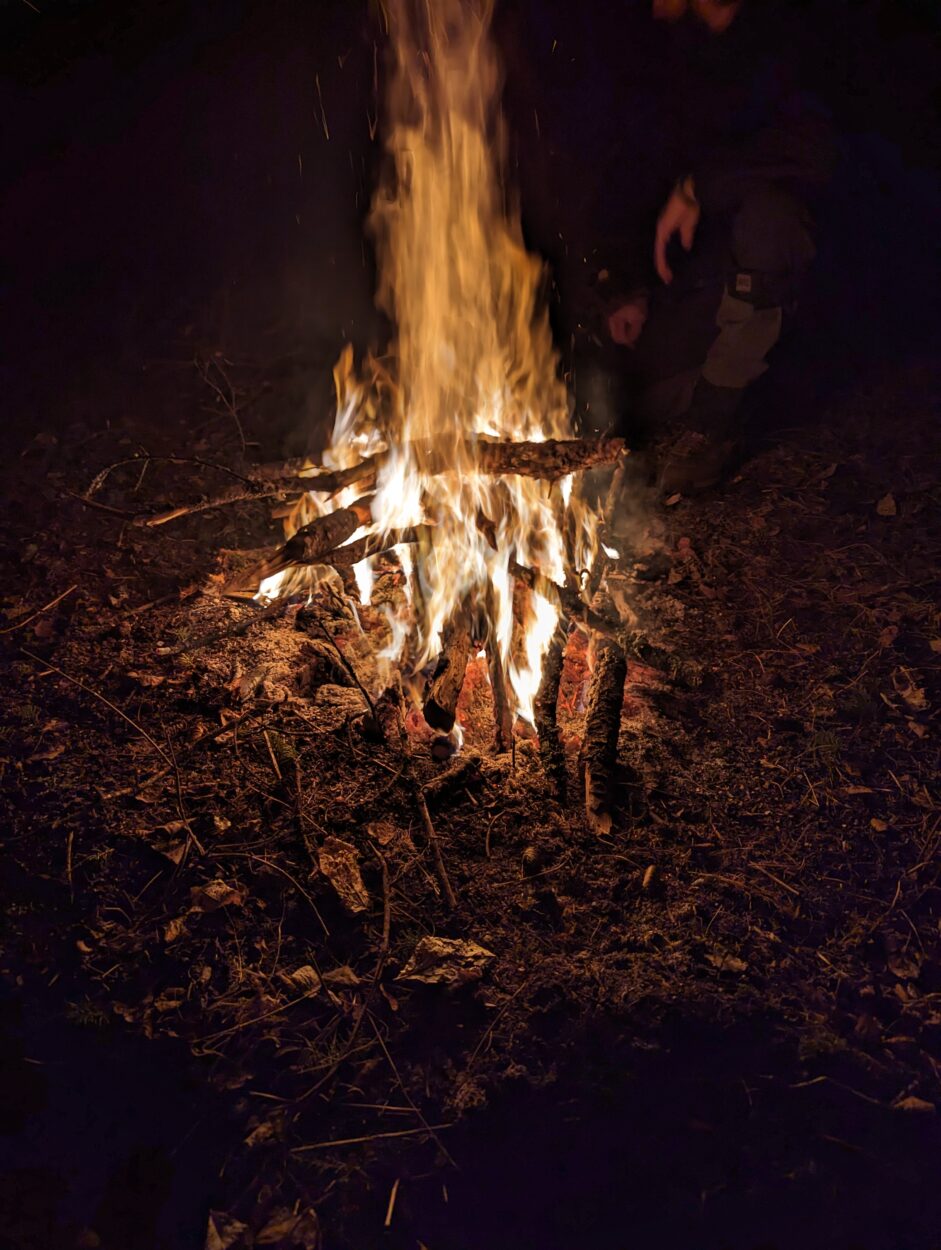
Hiking Back: Packing up and Hiking Out
After the night tucked warmly away in our sleeping bags and quilts, I got up before the sun and started up the morning fire. The others (and the sun) soon joined me, and we melted more snow so we could enjoy some coffee. I brought along a collapsible pour-over coffee dripper which makes excellent coffee, and it’s so easy to use. After brunch, and then some target shooting, we packed up our campsite, put out the fire and got ready to hike back out to the truck.
The temperature was cooler than the day before with cloud cover. But the hike was still good. As we had retraced our steps a fair distance the day before in search of the perfect clearing, we only had about a 5km hike. Still, for me not having done this much at all, my joints were hurting under the extra weight! I found it interesting, though, that it was my legs (heels, knees) that hurt. My upper body, with the heavy pack strapped on, felt great! It was proof to me how much a properly fitted backpack, sized for the occasion, makes such a difference.
Conclusion: Winter Camping, A Warm Adventure
So for my first winter camping trip, would I rate it a success? Was it enjoyable? And would I do it again?
Yes, yes and most definitely yes!
The first time I heard about winter camping, I scoffed wondering why anyone would choose to go out and be cold and uncomfortable (as I’m sure many of you are doing to me now). But, when done right, it just isn’t that way at all. With the correct gear, you can stay warm, comfortable, and not have to worry about a single bug!

If you are one of those that would like to have a similar adventure, but you’re unsure whether or not you have the right gear, or the right know-how, come talk to us. Or maybe you would prefer to join us on our next one? We can do that too! These adventures are always more fun in a group.
And, with all the hustle and stresses of life, isn’t being out in nature just what most of us need? Being able to get away, sit back and just relax to the sound of a crackling fire under the stars. There’s really nothing better.

